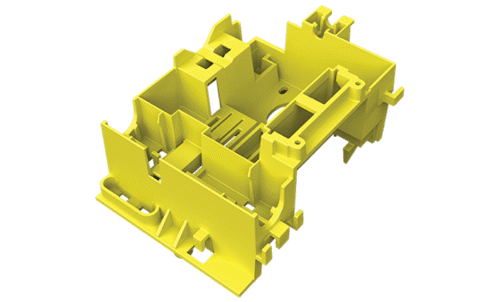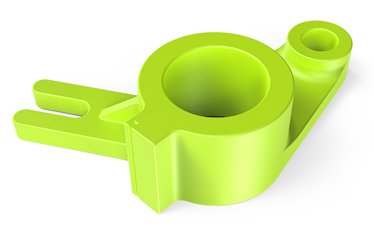Email:
info@miocuisine.com
Get custom plastic molded prototypes and production parts delivered in just five business days. Benefit from our expert engineering reviews and enjoy $800 off your first mold. Choose from a wide range of materials and finishes to meet your specific needs.


Injection molding is a manufacturing process in which plastic materials are heated and melted, then injected into a mold through an injection molding machine and cooled to shape. The process includes the steps of heating, injecting, cooling, and demolding, and is capable of producing complex shaped plastic products quickly and efficiently.
Injection molding is capable of producing complex shapes and precise sizes of plastic products in large quantities in a short period of time, which greatly improves production efficiency.
Products manufactured through injection molding are of high consistency and quality, reducing the rate of defective products and lowering production costs. In addition, the multiple use of molds greatly reduces the production cost of a single product.
Injection molding can use a variety of different types of plastic materials, including thermoplastics and thermosets, to meet the needs of different products.
Design Flexibility

A wide range of complex geometries can be produced through injection molding, which provides great flexibility in product design, enabling many designs that would be difficult to achieve through traditional manufacturing methods.
Injection molding is widely used in many industries such as automotive, electronics, electrical appliances, medical devices, packaging, etc., and is an integral part of modern manufacturing.
Injection molding is a process in which plastic materials are heated and melted, then cooled and molded by injecting them into a mold under high pressure. This process allows for the production of plastic products of various complex shapes and precise sizes.

Charging:Plastic granules or powdered material are fed into the hopper of an injection molding machine.
Heating and melting:The plastic material in the hopper is conveyed to a heated cylinder where it is melted into a fluid state by means of a heater.
Injection:The melted plastic is injected into a pre-designed mold by means of a screw or plunger under high pressure.
Cooling Molding:The plastic injected into the mold is cooled and solidified in the mold to form the desired shape.
Demolding:The mold opens and the finished product is ejected and removed.
Machines and molds play a crucial role in the manufacturing industry. Firstly, machines are the backbone of the production process, enhancing efficiency and product quality through automation and precise control. They can perform a variety of complex tasks, from simple assembly to high-precision machining, significantly reducing the need for manual labor and minimizing operational errors.
Secondly, molds are essential tools for creating specific shapes and sizes. Whether in injection molding, stamping, or casting processes, molds determine the accuracy and consistency of the final product. High-quality molds ensure that every product meets design specifications, reducing waste and subsequent processing costs.
The combination of machines and molds enables mass production while maintaining high levels of precision and consistency. This not only boosts production efficiency but also ensures the quality and reliability of products. Therefore, machines and molds are indispensable in modern manufacturing, driving industry growth and innovation.

Properties: Lightweight, chemical resistant, and flexible.
Applications: Packaging, automotive parts, and consumer goods.

Properties: Strong, impact-resistant, and easy to mold.
Applications: Automotive components, electronics housings, and toys.
Properties: High impact resistance, transparent, and heat resistant.
Applications: Lenses, safety helmets, and medical devices

Properties: High strength, wear-resistant, and good chemical resistance.
Applications: Gears, bearings, and mechanical components.

Properties: Excellent chemical resistance, flexible, and moisture resistant.
Applications: Containers, pipes, and household goods.

Properties: Strong, transparent, and good barrier properties.
Applications: Bottles, food containers, and textile fibers.



When selecting a partner for custom injection molding, it’s essential to find a company that offers high quality, cost-effectiveness, and flexibility. Here are the key advantages of choosing our custom injection molding services:
Our team of experienced designers and engineers provides comprehensive support tailored to your needs, from initial concept to final product. Using advanced design software and tools, we optimize product designs to ensure functionality and manufacturability while reducing production costs.
We offer a wide variety of material options, including ABS, PC, PP, and nylon, ensuring you can select the best material for your specific application. Our material experts can help you choose the right material based on mechanical, thermal, and chemical properties to meet your product’s requirements.
We utilize state-of-the-art machining processes such as CNC milling and EDM to create high-precision molds, ensuring accurate and consistent parts. Our molds are made from durable materials like hardened steel or aluminum, depending on the production volume and material being molded, ensuring long-lasting performance.
We maintain precise control over injection pressure, speed, and temperature to ensure consistent part quality and minimize defects. Our advanced cooling systems reduce cycle times and enhance production efficiency without compromising part quality.
We implement rigorous inspection processes using tools like CMMs, optical scanners, and visual inspection to ensure parts meet exact specifications. We also perform mechanical, thermal, and chemical tests to verify material properties and part performance, ensuring the highest quality standards.
By balancing injection, cooling, and ejection phases, we maximize productivity while maintaining high-quality standards. We also utilize automation for tasks such as part removal, assembly, and packaging, enhancing efficiency and reducing labor costs.
We help you choose cost-effective materials that meet your required specifications, balancing quality and budget. We balance initial tooling investment with expected production volume, ensuring cost-efficiency throughout the product lifecycle. Additionally, we monitor and manage energy consumption, labor, and maintenance costs, keeping overall production expenses in check.
We provide trimming, deburring, and surface treatments to achieve the desired finish and functionality of your parts. We also offer assembly services to integrate molded parts into final products, ensuring compatibility and performance.